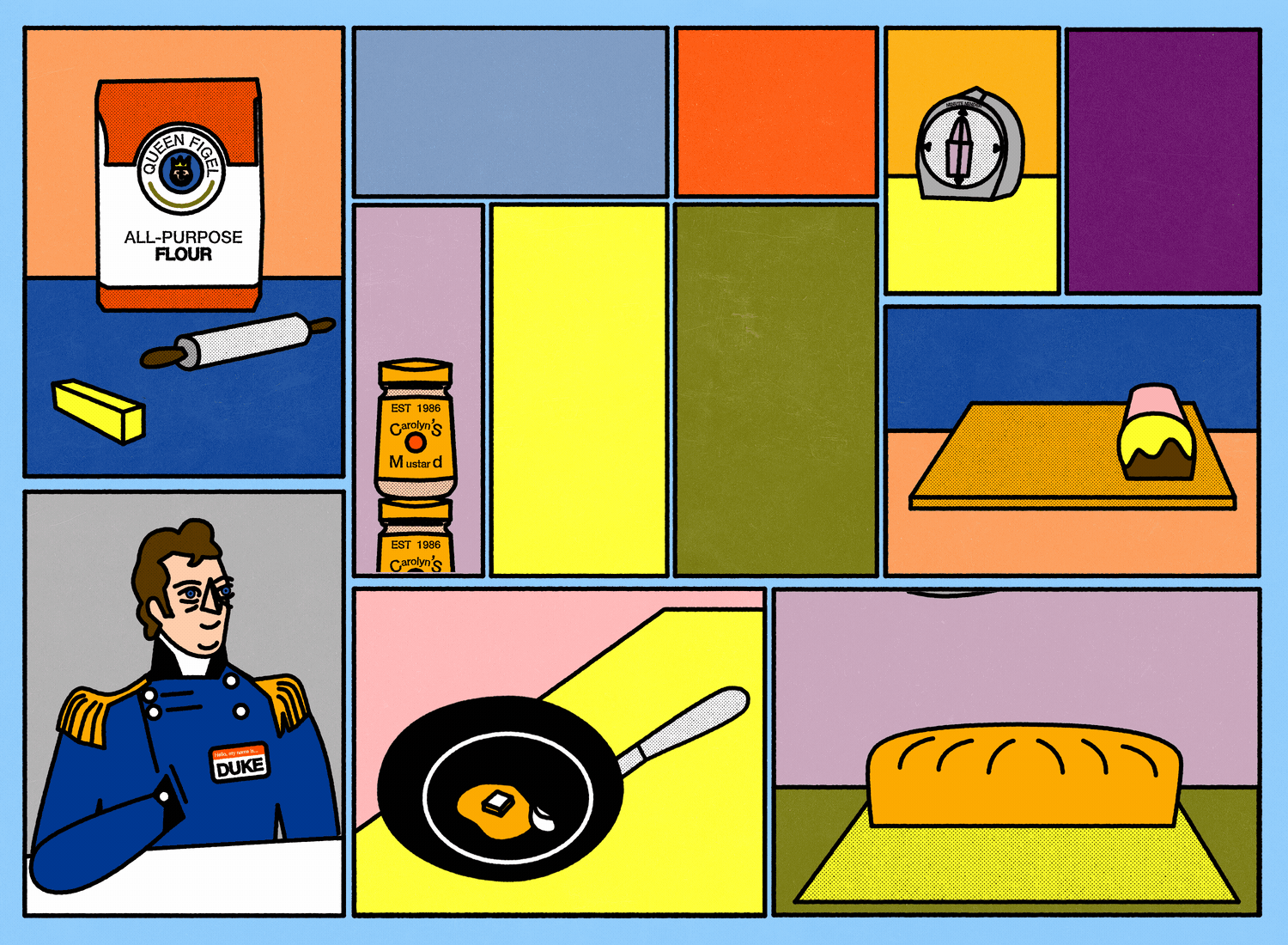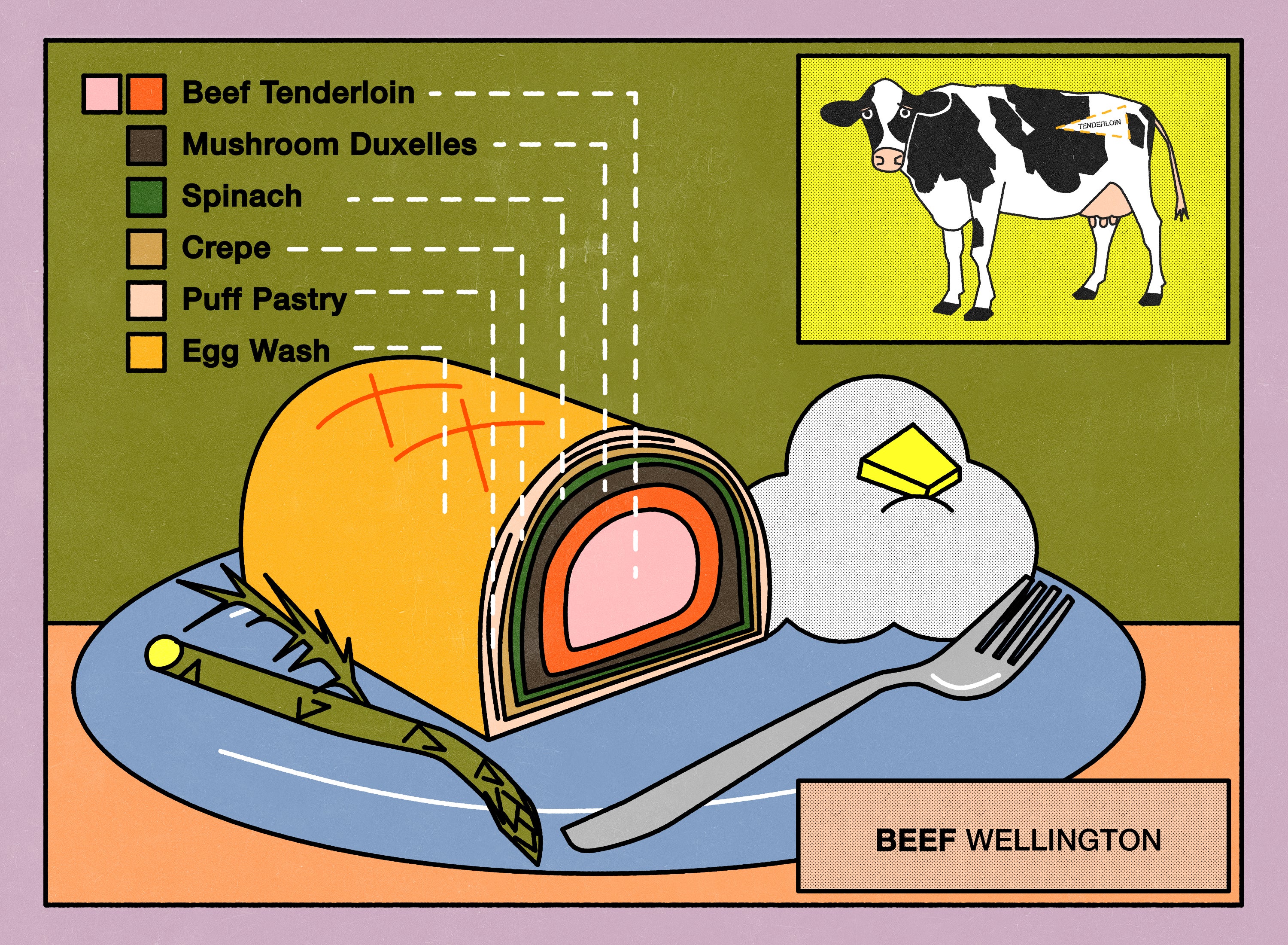
No, you’re not going to destroy an entire tenderloin. Yes, everything is better wrapped in puff pastry.
Beef tenderloin is one of the most luxurious hunks of meat that money can buy. Riding high on the cow, it’s a gentleman’s muscle. It’s soft and tender enough to cut with a butter knife, and it really needs no embellishment. But rolled in mushroom duxelles and wrapped up in golden puff pastry, the result is something even better: beef Wellington. And with a little bit of careful groundwork, it’s not quite so daunting as you might think.
The dish is likely named after the first Duke of Wellington, a long-nosed Irishman who conquered Napoleon at the Battle of Waterloo in 1815 and apparently liked his roast dinners. It’s not entirely clear whether Wellington actually ate the dish or simply served as its inspiration. The duke also popularized some pretty dashing rain boots, and some claim the beef resembles the shape of the boot, which seems like a pretty big leap. The French also have a suspiciously similar filet de boeuf en croȗte. But according to the Oxford English Dictionary, the first mention of the British counterpart in literature wasn’t made until the late 1930s, in New York.
Regardless of the exact origin, beef Wellington is quintessentially British and derives from a long history of wrapping meat in pastry. For centuries, the British have used pastry to store and transport meat, from medieval pies traveling long roads to Cornish miners trying to keep out the coal dust. Eventually, necessity turned into good eating, and today, pies are piping with nostalgia. “Every time you eat a savory pie, it transports you back to your family table,” says Calum Franklin, executive chef at the Holborn Dining Room in London. “It’s an ingrained part of our culture. To me, Wellington is one of the most important British dishes, the centerpiece of a celebration, intended for sharing, and quite comforting.”
Wellington may have a stiff reputation—military commanders, fancy hotels—but it’s actually worth making at home (and not as hard as you think) for a special occasion. The most daunting part is working with puff pastry, getting a tight roll, and achieving the golden crust without sabotaging your expensive steak. Most cooks either undercook the pastry or overcook the beef. But Franklin insists that you can handle this as long as you pace yourself.

A few words of wisdom, before going into battle: “Don’t expect to come home from work and knock it out for dinner,” cautions Franklin. “Give yourself two days.” On day one, prep the components, searing the steak, sautéing the mushrooms, steaming the spinach, and making the crepes. On day two, assemble, roast, rest, and carve.
For the beef, look for a trimmed center-cut fillet, season it well with salt and pepper and rub with vegetable oil, and then gently roll it through a smoking-hot pan for less than a hot minute, just to pick up a bit of color—you’re not cooking through. For the puff pastry, don’t be a hero. You can totally use store-bought. It doesn’t even have to be fancy and French, because all-butter pastry can be unpredictable, whereas a little bit of vegetable oil lends structure. Not all recipes agree on the fillings, and there are variations on both sides of the pond, with paté, wild mushrooms, even prosciutto.
Franklin is a purist, focusing on traditional English flavors, with a swipe of hot mustard and a bit of mushroom and spinach in every bite. Franklin rolls out steamed spinach between thin, absorbent kitchen towels (J-cloths), a brilliant maneuver that dries and flattens in one stroke. Above all, the pancake is your secret weapon. A savory crepe serves two purposes, wrapping as snugly as a burrito, as well as locking in moisture so that it doesn’t seep into the outer pastry and make it soggy.
Finally, let the mighty rest in peace. “The greatest disappointment is rushing in, cutting too soon, and watching the juice bleed out,” Franklin warns. “A big cut of meat needs to relax for at least half an hour. I promise, your beef will be pink throughout.” This would be an ideal moment to make a gin and tonic and sharpen your weapons. You want a very sharp serrated knife to slice through golden pastry and pink steak to victory.